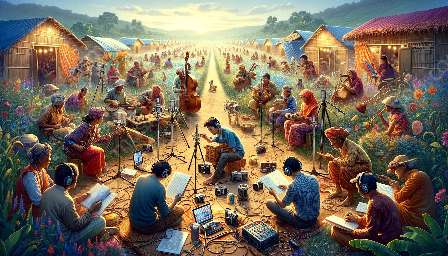Urbanization has significantly impacted traditional musical practices, leading to changes in cultural identity, transmission methods, and performance contexts. Ethnomusicologists employ ethnographic research methods to study these implications and their effects on traditional music.
Urbanization and Ethnomusicology
Ethnomusicology is the study of music within its cultural context, and urbanization has brought significant changes to traditional music around the world. As people migrate to urban areas, traditional musical practices interact with new influences, technologies, and social structures, leading to both preservation and transformation of musical traditions.
Implications of Urbanization on Traditional Musical Practices
Urbanization has led to several implications on traditional musical practices:
- Cultural Identity: Urbanization may challenge the cultural identity associated with traditional music, as the diverse urban environment can promote hybridity and the blending of musical traditions.
- Transmission Methods: Traditional music is traditionally passed down orally within communities, but urbanization has introduced new transmission methods such as recordings, notation, and formal education.
- Performance Contexts: Urban settings provide new performance opportunities for traditional musicians, such as concert halls and festivals, while also influencing the development of new genres and styles.
Ethnographic Research Methods in Ethnomusicology
Ethnographic research methods are essential for understanding the implications of urbanization on traditional musical practices:
- Participant Observation: Ethnomusicologists engage in participant observation to immerse themselves in the musical communities, understanding the social and cultural context within which music is created and performed.
- Interviews and Oral History: By conducting interviews and collecting oral histories, ethnomusicologists document the experiences and perspectives of musicians, providing valuable insights into the impact of urbanization on traditional music.
- Archival Research: Accessing archival materials allows ethnomusicologists to trace the historical development of traditional music and understand how urbanization has shaped its trajectory.
- Fieldwork: Ethnomusicologists conduct extensive fieldwork in urban and rural areas to explore the changing dynamics of traditional musical practices within the context of urbanization.
Conclusion
Urbanization has complex implications on traditional musical practices, and ethnomusicologists play a crucial role in documenting and understanding these changes through ethnographic research methods. As urban environments continue to evolve, the study of traditional music within the context of urbanization remains an important and dynamic area of ethnomusicological inquiry.



































